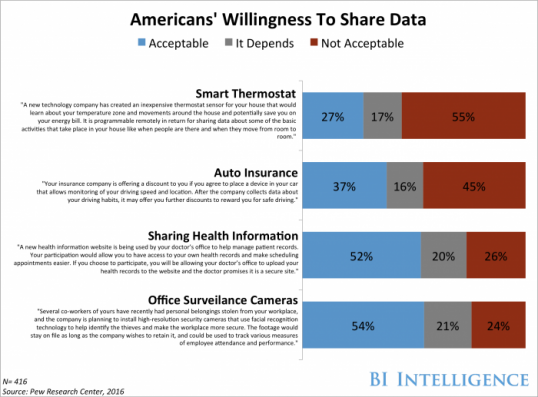Americans are in an “it depends” state when it comes to disclosing personal information over internet-connected devices, according to a new Pew Research Center study. The study proposed different scenarios to which 461 Americans expressed whether they believed being monitored by a device was acceptable, not acceptable, or depended on the situation. Pew Research Center found that some scenarios were acceptable to the majority of Americans, but the answers often came with caveats. For example, most consumers find a security camera in the office acceptable, but with restrictions; one person said, “It depends on whether I would be watched and filmed every minute of the day during everything I do.”
Here are the responses to the IoT-related scenarios the study presented:
• Office surveillance cameras: More than half (54%) of Americans believe that it’s acceptable for a surveillance camera in the workplace, making it the most acceptable of the six proposed scenarios. Another 21% answered “it depends,” while 24% said it would not be acceptable.
• Sharing health information with your doctor: 52% of Americans believe it’s acceptable for their doctor to utilize a website to manage patient records and schedule appointments, 20% answered “it depends,” and 26% thought it was not acceptable. This correlates with iTriage survey, which indicated that 76% of consumers feel comfortable transferring wearable health data to their practitioner.
• Usage-based auto insurance: 37% of respondents answered it was acceptable for auto insurance companies to collect information via a UBI dongle, such as Progressive’s Snapshot, and offer discounts for safe driving. 45% said it was not acceptable, while 16% said “it depends.”
• Smart thermostat: 27% of respondents said it was acceptable for a smart thermostat in the house to track where the occupant is and share that data. More than half of respondents (55%) said it was not acceptable, and 17% answered “it depends.”
Through focus groups and open-ended answers, Pew narrowed down the top reasons consumers believe sharing information is unacceptable: Through focus groups and open-ended answers, Pew narrowed down the top reasons consumers believe sharing information is unacceptable:
1) The threat of scammers and hackers;
2) Being repeatedly marketed from companies collecting data;
3) They do not want to share their location;
4) They think it’s “creepy”;
5) The companies collecting the data have ulterior motives to use it.
Data privacy will continue to be a big trend as the Internet of Things market matures. Device makers should be transparent about the data being collected and what it’s used for. Further, they should ensure the devices and their associated data storage bases are secure.
To read more of this article and the original story follow this link to Business Insider.
